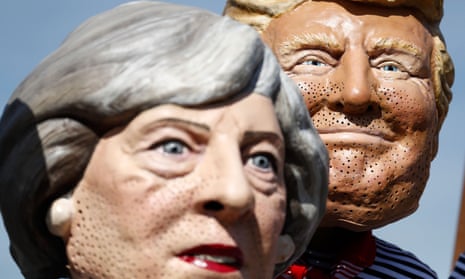How knowingly we all nodded six months ago, when Theresa May went to a Brussels summit and no one talked to her. While the 27 other leaders greeted one another warmly and went off to dinner, May cut a lonely figure, returning quickly to London. It was Jona Lewie’s song about always being in the kitchen at parties made real. And it was a Brexit metaphor incarnate.
But we hadn’t seen anything yet. Back then, the early post-Brexit confidence still lay around May’s shoulders. The leave vote still fresh, she could brush off the isolation, political dignity intact, and ratings still rising. Six months on, still in office but no longer in power, much has changed. When May takes to the international stage in Hamburg tomorrow for the G20 summit, she will be a more isolated figure than ever.
Some of that is due to the damage from the Tories’ June election disaster. But the pitiless reality of what Brexit actually means is the much deeper reason. It’s not just May herself whose place at the top table now looks shaky. It is Britain’s too.
To say this is not to fall for the notion that Brexit suddenly makes Britain insignificant, relegated to the second division, a quaint offshore island of little consequence. That’s not true. Britain remains in the top 10 of most global rankings, and the top half dozen of those that confer most weight – economic, military, education, stability, soft power. Beware the easy myth of terminal decline.
In one sense, indeed, it is a tribute to Britain’s importance, not to its lack of it, that the G20 is taking place amid greater global uncertainty than almost any of its predecessors. Brexit is not the sole reason for this, of course. Donald Trump’s erratic and provocative leadership has put the US’s role as the guarantor of the world’s security, trading and environmental agreements at risk. China’s hard-eyed view of global power, and Russia’s opportunism, create other uncertainties.
Britain has nevertheless lost influence and will continue to do so because of Brexit. Boris Johnson went on the Today programme earlier today, partly to talk up Britain’s relationship with Trump, but also to claim that Britain’s long embrace of the US makes us the ally that can shift Trump’s America “into a better place” on issues such as Nato, climate change and the Iran nuclear accord.
To put it at its mildest, it was ironic that Johnson could make that tendentious claim on the day when Sir John Chilcot raised fresh criticisms of Tony Blair’s Iraq policy and Trump delivered a highly nationalistic speech in Warsaw. Blair too thought that Britain could shift the US into a better place – or at least that was what he said he thought. But as Chilcot said, the amount of effective influence exerted by Britain on America in 2003 was “very slight and short-lived”. Things do not change.
And it was doubly ironic that Johnson should make the influence claim on a day when one of his most recent predecessors as Conservative foreign secretary was knocking it down. Shortly after Johnson’s BBC interview, William Hague told a House of Lords committee that Britain’s influence over America and in world affairs more generally was being significantly weakened by leaving the EU. Hague made three strong points. Britain’s global clout has been amplified by EU membership. Britain’s self-image as a bridge with America mattered because it was a bridge that reached to Europe. And Britain’s role in Europe helped to prevent fragmentation within the Nato alliance. That influence will now inescapably diminish.
As the months have unfolded since the Brexit vote, most of the flippant deceptions of the leave campaign have collapsed. Few now swallow May’s talk of a clean Brexit, much less of a red, white and blue version. Most now grasp that, at best, Brexit will be a bundle of compromises, few of them advantageous. Almost no one apart from Liam Fox now thinks that, especially in the age of Trump, there is a viable or desirable Atlanticist, or even Anglosphere, alternative to the historic reality of Britain in Europe. As the former Nato chief George Roberston put it at Thursday’s Lords committee session, the geography hasn’t changed, the threats haven’t changed, and the imperative of European cooperation hasn’t changed either.
The myth of the Anglosphere alternative needs nailing. These ideas have old roots. They have shaped a lot of British thinking in different ways, not just on the right of politics, for at least 150 years. In their 2017 incarnation, however, they run into two immovable facts. First, UK trade with the Anglosphere nations has massively declined from its pre-1914 peak; realistically, the US is now the UK’s only significantly large Anglosphere trading partner. Second, the US has long treated bilateral trade deals as zero-sum games, played on US terms, even before the election of an ultra-nationalist president, never mind now.
Last month, at a British Academy conference on the Anglosphere, John Ravenhill of Canada’s Balsillie school of international affairs summed up the trade realities in this way. The biggest trade challenge for the post-Brexit UK is not to get better trade deals with the rest of the world, but to get deals that are as good as those that now exist, most of which are multilateral and regional. In the end, said Ravenhill, “geography trumps history”.
Which brings us back to Europe and the G20. A recent Pew poll in 37 nations underlines that the globally unpopular Trump is the ally from hell. The most trusted leader is Angela Merkel. Merkel is an internationalist, a believer in law, a free trader and the leader of the dominant nation in the EU. German voters trust her and her centre-right party in ways that May and the Conservatives can now only dream of, because she embodies the economic security, humane values and competence they do not.
If, in Hamburg, May and Britain were standing shoulder to shoulder with Merkel, Germany and the EU, then Britain would indeed be a significant and effective global player. Instead, trapped by Brexit, apologising for Trump and pursuing a delusional trade strategy, Britain and its weakened prime minister cut a pitiful and destabilising figure on the international stage.

